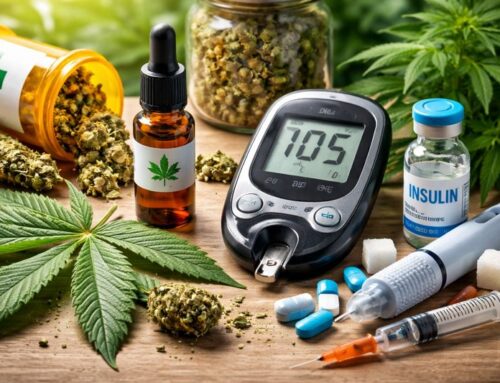Conversations about cannabis have grown rapidly in recent years. It was once a taboo subject, but now it is part of normal health discussions. For many, it is no longer just about leisure—people are turning to it with questions about how it might affect their health.
One of the most pressing questions is its impact on mood disorders. Millions of people deal with conditions that affect their mood every day. As research expands, we are beginning to learn more about how it interacts with the brain—for example, cannabis’s effects on mood disorders. A lot of work is being done to find out whether it has a place in managing or controlling mood-related conditions.
In this article, we will explore cannabis and mood disorders, how they are related, and how medical marijuana or cannabis products may affect mood disorders.
Understanding Mood Disorders
These are one of the most common mental health challenges in the US. Each year, many people are affected by conditions like:
- Depression,
- Anxiety, and
- bipolar disorder.
These disorders can make everyday life more difficult. They can change the way a person feels. Plus, it can have an impact on the way in which one thinks and behaves.
Therapy and medication have long been the standard. But it is not possible that all patient responds to these options in the same way. That is one reason people have started asking if cannabis could provide a supportive role in treatment.
How Cannabis Affects the Brain?
If you want to understand mood disorders and cannabis, you should know how it interacts with the brain. Cannabis contains cannabinoids, and the two most common ones are:
- THC or tetrahydrocannabinol, and
- CBD (also referred to as cannabidiol).
These compounds connect with receptors (present in the brain and body that are part of the endocannabinoid system). This system helps regulate many functions, including
- Mood
- Stress response
- Sleep
When someone uses cannabis, cannabinoids can influence this system. THC is known for producing the “high” feeling. But it may also affect mood, either positively or negatively. This will depend on the person and the dosage. CBD does not create a high. According to researchers, CBD may reduce anxiety and stress.
Depression
This condition affects an estimated 21 million adults in the United States every year. Antidepressants and therapy are some traditional treatments that help many. But some patients find little relief. This gap has sparked interest if this grass can ease symptoms of depression.
Studies so far suggest mixed results. Some research indicates that it may temporarily lift mood. Due to this, people feel more relaxed. For those struggling with low energy and sadness, this effect can feel like a welcome relief.
But other studies show that long-term and heavy use of the weed could actually worsen depressive symptoms. The difference comes down to
- Dosage
- frequency of use
- Individual brain chemistry.
What we know so far is that cannabis might help those with short-term symptom relief. But it is not a proven method for depression treatment. More clinical research is needed before doctors can recommend it as a reliable option.
Anxiety
This is another major concern. More than 40 million Americans live with this disorder each year. Symptoms can include
- constant worry
- physical tension
- panic attacks
Many people report that it helps calm their nerves. It also helps in making social situations easier. CBD, in particular, has shown promise in studies. Researchers have found that CBD may reduce anxiety in people with
- social anxiety disorder
CBD does not cause intoxication. Hence, great for people who want relief without feeling high. But this plant is not a one-size-fits-all solution. For some, THC can actually increase anxiety (especially in high doses). People may experience the following problems after using strong strains:
- racing thoughts
- paranoia
- panic attacks
That is why many health professionals advise caution. But before using cannabis for anxiety relief, you should know the way your body reacts.
Bipolar Disorder
This condition causes cycles of depression and high energy. People may move between low moods and periods of mania.
Researchers are still trying to find out the way it affects people with this abnormality. Some patients say it manages their mood swings. Others say that it makes symptoms worse.
There is concern that its use during manic episodes could intensify symptoms. This can lead to risky behavior. Some studies, at the same time, suggest it might provide relief during depressive phases. The evidence is not strong enough to support this plant as a treatment for this disorder. Medical professionals recommend caution.
The Role of Medical Marijuana Programs
As more states legalize medical marijuana, patients with mood disorders are checking this option under medical guidance. Licensed doctors can evaluate whether a patient qualifies. They can help them understand the application process. It is not approved by the FDA for treating mood disorders specifically. But some patients may receive recommendations based on related conditions like
- PTSD
- chronic pain
- insomnia
These programs provide a safe and legal way for patients to try cannabis with professional oversight. Licensed products are safer. The reason is that they meet quality standards. Unregulated cannabis can carry uncertain levels of THC and harmful contaminants.
Risks and Considerations
Use of Cannabis is not risk-free. If you have a history of mood disorders, then do not take it for the long term. Its heavy use may complicate symptoms. Young adults and teenagers may be vulnerable as their brains are still developing. There is also the risk of dependency. In this, people feel the need to use it regularly to function. Doctors stress the importance of open conversations. Hence, anyone using cannabis for mood disorders should talk with a licensed expert. Together, they can weigh potential benefits against possible risks.
Cannabis and mood disorders Research
The study of this plant and mood disorders is still in its early stages. For many years, there have been strict regulations and limited research. This leaves many questions unanswered. Today, as laws change, researchers are finally able to check it in more detail. Clinical trials are ongoing. The motto of these trials is to better understand the way it affects conditions like depression and PTSD.
The hope is that future studies will provide clearer answers. Researchers want to know some facts. For example:
- Which cannabinoids help the most?
- What doses are safe?
- Which patients are most likely to benefit?
Until then, cannabis remains an option that requires careful decision-making.
Living with Mood Disorders and Looking For Options
It is never easy to live with a mood disorder. This affects your daily life and health. Therapy and medication remain the most reliable choices for now. But what about those who have not found relief? For such people, cannabis may be a possible option worth discussing with a doctor.
The key is to approach it with balance. It is not a cure. It should never replace professional care. But when used responsibly and with guidance, it might provide comfort to some people.
Conclusion
Cannabis and mood disorders relationship is complex. Some studies suggest the short-term benefits of medical Cannabis. Others warn of risks with long-term use. What we know so far is promising but incomplete. Patients deserve accurate information. They need access to professional support. It may one day become a valuable tool in managing mood disorders. But for this, it should be used thoughtfully and carefully. Until then, ongoing research and open conversations experts are the best way forward.
But one thing is clear, i.e., access to safe and regulated products matters. If you are considering medical this weed as part of your care, working with licensed doctors can help you. They can make sure you meet state requirements. EZMedCard makes it simple to get your medical marijuana card in a safe way.
FAQs
Can cannabis help treat mood disorders like depression or anxiety?
Cannabis may offer short-term relief for some people with mood disorders like depression or anxiety. Compounds like CBD have shown promise in reducing stress and anxiety symptoms. However, research is still ongoing, and cannabis is not a proven or FDA-approved treatment for mood disorders.
What is the difference between THC and CBD when it comes to mental health?
THC is the psychoactive compound in cannabis that produces a “high” and can affect mood—positively or negatively—depending on the person and dosage. CBD, on the other hand, does not cause intoxication and has been studied for its potential to reduce anxiety, stress, and improve sleep, making it a safer option for many.
Can cannabis worsen mood disorders over time?
Yes, long-term or heavy cannabis use—especially with high THC content—may worsen symptoms of mood disorders for some individuals. It can lead to increased anxiety, depression, and even dependency. That’s why it's important to use cannabis cautiously and under medical supervision.
Is medical marijuana legal for treating mood disorders?
While the FDA has not specifically approved medical marijuana for mood disorders, some states allow it to be recommended for related conditions like PTSD, chronic pain, or insomnia. Patients can consult a licensed medical professional to see if they qualify under their state’s medical marijuana program.
Is it safe to use cannabis for bipolar disorder?
Cannabis use in bipolar disorder is controversial. Some patients report symptom relief during depressive phases, but it may worsen manic episodes or trigger risky behavior. There is not enough strong evidence to support its use, and medical experts recommend caution.





